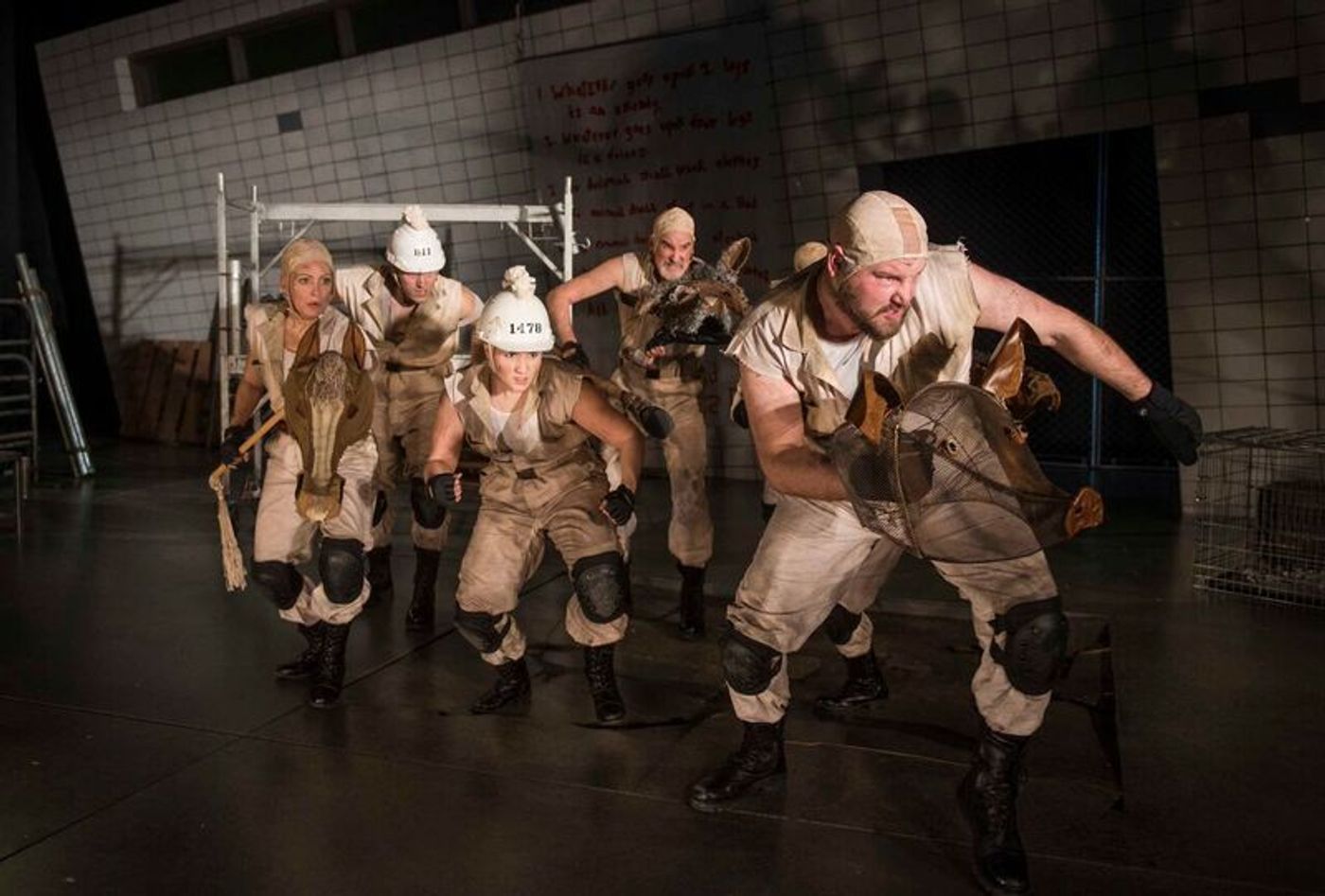Review: ANIMAL FARM Makes for Relevant, but Rocky Theater at the Milwaukee Rep

Bleak. Cold. Apocalyptic. Even before the house lights dimmed, the mood was already dreary. The stage is laden with a mess of concrete, metal, and a visual manifestation of shattered dreams for what would be a rather brain-wrenching, hope-dashing 90 minutes.
Of course, that's just what Orwell's novel is meant to convey. As the Rep describes it, Animal Farm is a "timeless and devastating allegory of idealism betrayed by the desire for personal power." The story begins at Manor Farm, where the barbarously-treated animals long for a better world. Old Major, a wise boar in the twilight of his life, addresses the animals, calling for rebellion and teaching them the song of the revolution, "Beasts of England."
Horses, sheep, pigs, and mules alike band together to drive out the abusive Farmer Jones. Together, they create Animal Farm - a place where all animals are equal and all creatures abide by seven noble commandments. But when two pigs, Napoleon and Snowball, step up to the plate as leaders, "equal" doesn't last for long. The horses are overworked and illiterate, the sheep follow the pigs' rule blindly, and the swine leaders slowly twist every one of their seven commandments to suit their own selfish agenda - an agenda of power, leisure, and greed.
As Director May Adrales says, "There will always be those that exploit others in order to gain advantage. There will always be pigs." The Rep's Animal Farm certainly drives home this vicious cycle of revolution, newfound power, and newly-broken dreams. However, if you're waiting to applaud a glimmer of hope in the future as the actors take their bow, you've come to the wrong farm. The Rep really does deliver on the bleakness - but to the success of the play and justice to Owell's story? It's complicated.
Sure, there's the always-terrific Deborah Staples as Clover, the horse whose optimistic spark perseveres. But her last hopeful monologue comes prior to the final scene, where the pigs-in-charge are now walking on two feet, donning human clothes, and feasting with humans. In short, the pigs and the humans are at last one and the same. It's grim, and though that may be as Orwell intended, the heaviness of the content paired with certain modes of execution sometimes outweigh the enjoyment of Animal Farm's finer points.
Beyond the missing note of hope, certain things about the production felt like wannabe edgy, rather than actual edgy. Though the inventive costumes were a bright spot, small plush animals were bandied about in some scenes; it felt borderline juvenile and detracted from the otherwise remarkable costuming. Turns out there's good weird and, well, not-so-good weird.
Imagine the weirdness for these seasoned actors having to whinny, bleat, and snort-oink for their supper. That can't be an easy task. Yet they commit to their respective creatures - stand-outs being the aforementioned Deborah Staples, along with Stephanie Weeks as both the inspiring Old Major and loyal Boxer (a workhorse), and Tiffany Rachelle Stewart as both Mollie (a stuck-up mare) and Squealer (a press secretary pig) - each elitist in their own way. Weeks brings palpable passion and heart to the stage, while Stewart works her prancing pony costume like a true diva, drawing the lion's share of smiles and laughter.
Along with fine performances, the costumes are truly the jewel of Animal Farm. Costume Designer Izumi Inaba's creations buoy the imagination, as each sculpted animal head captures the look and essence of its character. Though there are multiple pigs and horses in the play, no two look alike. The fussy mare, Mollie, boasts soft curves and a coquettish expression. Boxer the workhorse appears sturdy and strong.
There's no question that Animal Farm is as relevant today as it was in 1945. Orwell's story drives home themes of fake news, misinformation, the rewriting of history, appeals to vapid statistics and false "science," the harm of illiteracy, the squashing of education, and the troubling idea that if the corrupt people in power deem that our best times are here and now, it must be so. To resist would mean certain revolution - and the vicious cycle goes on.
The point being made at the Milwaukee Rep's Animal Farm isn't a treat, but neither is our own political reality. While a portion of the audience visits the theater to escape that reality and find some lightness for an evening, others enjoy getting riled up by the blatant themes this story hammers home. Done well, gut-wrenching social commentary makes for brilliant, thought-provoking theater. In the end, this Animal Farm did indeed provoke thoughts - albeit, mixed ones.
Reader Reviews
Videos

